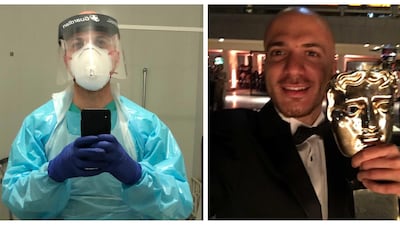The social media age throws up some unexpected celebrities.
Many are unworthy of their fame, but few could begrudge Syrian filmmaker and former Dubai resident Hassan Akkad's newfound attention, which was sparked by a photo on Twitter showing him ready to help clean a hospital in London.
Akkad's Tuesday, April 7 tweet of himself in protective gear while on shift as a cleaner at London's Whipps Cross Hospital has attracted close to 100,000 likes. It has also opened a much-needed debate about immigration in the UK media, with Akkad featuring on BBC, Good Morning Britain and many other media platforms.
The Syrian admits that the attention caught him by surprise: “It has been overwhelming, my inboxes are flooding with support, with messages from people in Palestine, the UAE, through Somalia, to Brazil, South Korea and Poland.
"I got messages from members of The House of Lords and from celebrities. I'm so honoured that I'm receiving all this support from people, but it has been crazy," he tells The National. "I'm scrubbing toilets and disinfecting wards in the morning, then going on air doing five interviews when I finish my shift."
Akkad says he has not received a single negative reaction to his tweet, although he is also at pains to point out that he did not post it in the hope of attracting praise.
“I did that tweet after a week of working and I was not sure whether I should tweet about it or not, because I did not want to do this for any self-gain or for attention, like ‘Look at me – I’m doing this',” he says.
“But then I said, I'll put it [out] just to send a message about opening borders and welcoming others and how, migrants and refugees ... we actually do call the country that gave us refuge home, and we can look after it and we will be on the front line.
"Let me put this into perspective. On my ward when I work in the hospital we are 20 people. There are two nurses from the Caribbean. There is a cleaner from Ghana, there is a cleaner from Senegal, nurses from Spain, Poland and Thailand. It's like the United Nations in one ward, everyone trying to do everything in their power to fight this virus."
It is not the first time Akkad has been in the public eye. When he arrived in the UK in 2016, the former English teacher, who spent two years teaching in Dubai from 2011-2013 and whose parents still live in Sharjah, featured in the Bafta-winning documentary Exodus: Our Journey to Europe.
Syrian refugees filmed their voyages to Europe for the documentary on smartphones, and Akkad had captured his harrowing boat journey from Turkey on camera.
Akkad says he is determined to put his current high profile to good use: “I am working on contacting Boris Johnson now, because I got this exposure and I'm going to use it for the greater good.
"This will change the discussion [on refugees,]" he says. "I watched Johnson's video he put out after he left hospital, and I saw a humbled Boris Johnson. Maybe we can make things happen better."
Akkad is also hoping to raise money for good causes and is asking those who hear his story, whether through Twitter or in the media, to donate to the five hospitals of the Barts Health NHS Trust and Choose Love's Covid-19 emergency appeal, a charity helping refugees in camps all over the world.
Both causes are dear to the filmmaker's heart, though as a former refugee himself, it is unsurprising that he is particularly vocal about the need to help them at this challenging time: "The situation in the refugee camps is dire," he says.
“People always say the pandemic is this great equaliser, but I disagree with that rhetoric because everyone is suffering, but self-isolating in Yorkshire is not like self-isolating in a camp in Greece. You do not have access to running water, you cannot sanitise your hands, and you cannot self-isolate in a tent."
The filmmaker says he and his fellow Exodus creators did not experience universally positive welcomes to the UK and Europe. Akkad says if anything, such negative sentiment had grown worse in the weeks before the coronavirus outbreak in Europe. "It spiked before corona because borders were being closed and militarised, the boats sent back, and the rhetoric – anti-migrant, anti-refugee – was on the rise," he says.
Akkad continued with his film and TV work in the UK until the virus brought production to a standstill. Refugees have been a constant subject in his creative work: he was a researcher on the Exodus sequel and also appeared in it; he was a consultant on Rufus Jones's Syrian refugee-themed sitcom Home; and a producer on Steve Chatterton and Mark Arrigo's short film Adnan.
“Right now my priority is disinfecting that ward and cleaning those toilets, because that is what I was hired to do,” he says. “But now I have a story and I want to share that story in detail, because every day is eye-opening when I interact with the patients and with my colleagues."
Will we see his perspective on film? "I do want to tell that story, and it is probably going to be in a film. Let us beat the virus, then we will see how it goes.”


